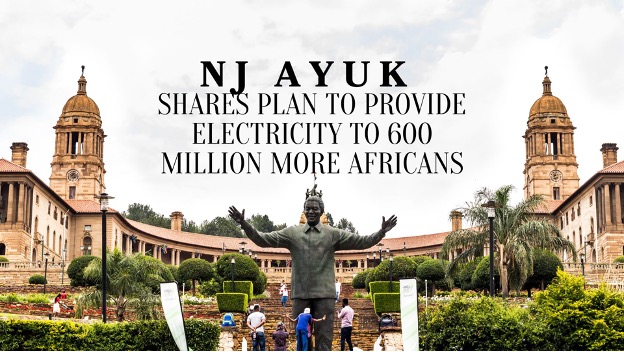As developed nations struggle to create more incentives to move toward sustainable energy sources, the policies created can leave less developed nations in rough shape. But NJ Ayuk, an Amazon bestselling author, chairman of the African Energy Chamber, and founder of Centurion Law Group, has a plan to change that.
More than 600 million Africans currently live without electricity. Many more live at the mercy of unreliable grids that regularly falter and leave them in the dark for hours or days at a time.
However, these cases of severe energy poverty can be ameliorated, NJ Ayuk argues. But doing so will require a renewed investment in fossil fuels.
Flexibility in Fossil Fuel Use Can Help Address Energy Poverty
In his most recent book, A Just Transition: Making Energy Poverty History With an Energy Mix, NJ Ayuk goes into detail about how to eradicate the lack of access to electricity that pervades much of the African continent.
The plan centers on helping African nations catch up to the prosperity Western countries have reaped since industrialization by advocating for a different kind of investment in the future of energy. While NJ Ayuk supports environmentalist efforts to wean nations off fossil fuels and onto sustainable forms of energy, he argues these policies should not apply equally across all countries.
Too often, he states, global solutions that champion green energy policies overlook the harm they cause to the world’s less-developed countries. This is especially acute in Africa, where energy poverty means 900 million people lack access to clean cooking technologies while vast reserves of oil and natural gas sit unused.
“Africa creates only 3% of carbon emissions despite being home to nearly 17% of the world’s population,” he said. “Africa must be allowed in industrialize.”
As a native of Cameroon who attended college and law school in the United States, NJ Ayuk saw early in life what kind of quality-of-life differences access to electricity makes.
But beyond the obvious aid that access to energy would provide for millions of Africans, the act of developing a new energy sector would also improve the economies of many states, he said.
“I come from fossil fuels, and I’m not ashamed of fossil fuels. I’m really proud of fossil fuels because I think they have driven human civilization. They have really created something that has brought on amazing achievements, and we have to embrace what they can do for Africa. At the same time, we can look at the future and start finding new solutions to replace them,” he said. “But fossil fuels present an amazing opportunity for young people in Africa to find jobs and be on the forefront of new energy solutions as well. That goes especially for African women, who have been overlooked for so long. We have the ability to correct those injustices.”
An Eventual Transition to Sustainable Energy
The second part of NJ Ayuk’s proposal is for Africa to move quickly from fossil fuels into sustainable forms of energy. This is what the title of A Just Transition is about. He points out that energy transitions can only happen once a source of energy exists. “You can’t transition from the dark to the dark,” he said.
He believes African countries can build an energy sector from the ground up that will make use of fossil fuels, but also quickly transition once sustainable energy sources mature.
Although Africa is behind much of the developed world, it won’t have to spend nearly as long on the transition from fossil fuels to green technologies, NJ Ayuk says. By building a malleable infrastructure, Africans can bolster both the short- and long-term future at once.
He calls this concept “leapfrogging.” As an example of how Africans have already leapfrogged modern technology advances, NJ Ayuk provided an example of the transition from landlines to cellphones. In more developed nations, the transition took a long time from the development of car phones to the modern portable devices. In Africa, it happened much quicker.
“I’ve seen what Africans can do. I grew up in a house where we had no cellphones. Nobody had a cellphone. Then we leapfrogged from that into cellphones,” he said. “So I know it is possible for Africans to be able to do that. Now the big questions are: What can you do to find innovative, creative ways to create jobs to capture this moment but also look at the obstacles and the bottlenecks that are in the way? How do we move away from underestimating Africa?”

 Flutterwave’s Continued Commitment to Enterprise Payments and Remittances
Flutterwave’s Continued Commitment to Enterprise Payments and Remittances Liquid Telecom appoints first woman CEO
Liquid Telecom appoints first woman CEO Ministry of Energy Engages Citizens in Dialogue on Zambia’s Energy Sector
Ministry of Energy Engages Citizens in Dialogue on Zambia’s Energy Sector NAPSA has disbursed 10% ($35m) for Lusaka-Ndola Dual Carriageway construction
NAPSA has disbursed 10% ($35m) for Lusaka-Ndola Dual Carriageway construction Construction of 100MW Chisamba solar plant to take 2 years
Construction of 100MW Chisamba solar plant to take 2 years Zambia to Miss 2024 Growth Target of 5% Due to Drought, Says Finance Minister
Zambia to Miss 2024 Growth Target of 5% Due to Drought, Says Finance Minister Absa and Hollard reach agreement on sale of Botswana, Zambia, Mozambique insurance businesses
Absa and Hollard reach agreement on sale of Botswana, Zambia, Mozambique insurance businesses Machine learning and AI is transforming fleet management
Machine learning and AI is transforming fleet management A burst of digital dazzle in the world of betting
A burst of digital dazzle in the world of betting Broker Beyond Boundaries: Exploring Exness in Detail
Broker Beyond Boundaries: Exploring Exness in Detail